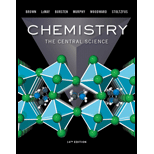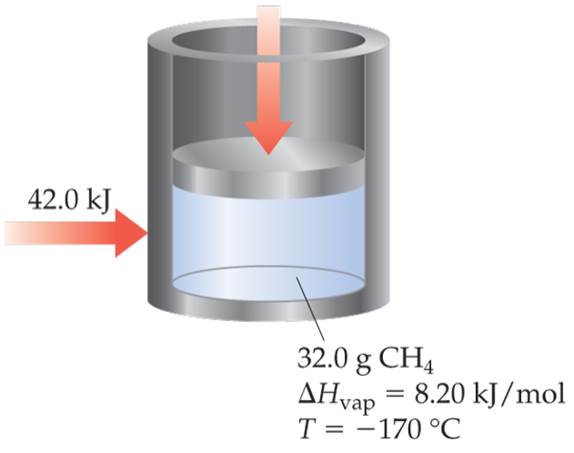
Study Guide for Chemistry: The Central Science
14th Edition
ISBN: 9780134554075
Author: Theodore E. Brown, H. Eugene LeMay, Bruce E. Bursten, Catherine Murphy, Patrick Woodward, Matthew E. Stoltzfus, James C. Hill
Publisher: PEARSON
expand_more
expand_more
format_list_bulleted
Textbook Question
Chapter 11, Problem 4E
If 42.0 kj of heat is added to a 32.0-g sample of liquid methane under 1 atm of pressure at a temperature of - 170ºC, what are the final state and themperature of the methane once the system equilibrates? Assume no heat is lost to the surroundings. The normal boiling point of methane is -161.5ºC.The specific heats of liquid and gaseous methane are 3.48 and 2.22 J/g-K, respectively. [Section 11.4□]

P= 1.00 atm
Expert Solution & Answer
Want to see the full answer?
Check out a sample textbook solution
Students have asked these similar questions
1. Provide a complete IUPAC name for each of the following compounds.
a)
b)
c)
OH
OH
OH
a)
b)
c)
2. Provide a complete IUPAC name for each of the following compounds.
a)
b)
a)
OH
b)
он
c)
OB
>=
c)
3. Provide a common name for each of the following alcohols.
a)
a)
OH
b)
OH
c)
HO
b)
c)
4. Provide a common name for each of the following compounds.
b)
OH
a)
5
a)
Y
OH
c)
OH
Using the critical constants for water
(refer to the table in the lecture slides),
calculate the second virial coefficient.
Assume that the compression factor (Z)
is expressed as an expansion series in
terms of pressure.
Chapter 11 Solutions
Study Guide for Chemistry: The Central Science
Ch. 11.2 - Which of the following substances is most likely...Ch. 11.2 - Prob. 11.1.2PECh. 11.3 - Prob. 11.2.1PECh. 11.3 - Prob. 11.2.2PECh. 11.4 - What information about water is needed to...Ch. 11.4 - Prob. 11.3.2PECh. 11.5 -
In the mountains, water in an open container will...Ch. 11.5 - Prob. 11.4.2PECh. 11.6 - Prob. 11.5.1PECh. 11.6 - Prob. 11.5.2PE
Ch. 11.7 - Liquid crystalline phases are produced by which of...Ch. 11.7 - Prob. 11.6.2PECh. 11 - Prob. 1DECh. 11 - Prob. 1ECh. 11 - Prob. 2ECh. 11 - Prob. 3ECh. 11 - If 42.0 kj of heat is added to a 32.0-g sample of...Ch. 11 - Prob. 5ECh. 11 - The molecules have the same molecular formula...Ch. 11 - Prob. 7ECh. 11 - Prob. 8ECh. 11 - Prob. 9ECh. 11 - Prob. 10ECh. 11 - Prob. 11ECh. 11 - Prob. 12ECh. 11 - Prob. 13ECh. 11 - Prob. 14ECh. 11 - Prob. 15ECh. 11 - Prob. 16ECh. 11 - Describe the intermolecular forces that must be...Ch. 11 - Prob. 18ECh. 11 - List the following molecules in order of...Ch. 11 - True or false: a. For molecules with similar...Ch. 11 - Prob. 21ECh. 11 - Prob. 22ECh. 11 - Prob. 23ECh. 11 - Prob. 24ECh. 11 - Prob. 25ECh. 11 - Prob. 26ECh. 11 - Prob. 27ECh. 11 - Prob. 28ECh. 11 - Prob. 29ECh. 11 - Prob. 30ECh. 11 - A number of salts containing the tetrahedral...Ch. 11 - Prob. 32ECh. 11 - a. What is the relationship between surface...Ch. 11 - Prob. 34ECh. 11 - Prob. 35ECh. 11 - Prob. 36ECh. 11 - The boiling points, surface tension, and...Ch. 11 - Prob. 38ECh. 11 - Prob. 39ECh. 11 - Prob. 40ECh. 11 - Prob. 41ECh. 11 - Prob. 42ECh. 11 - 11.43 For many years drinking water has been...Ch. 11 - Prob. 44ECh. 11 - Prob. 45ECh. 11 - The fluorocarbon compound C2 Cl 3£'y has a normal...Ch. 11 - 11.47 Indicate whether each statement is true or...Ch. 11 - Prob. 48ECh. 11 - 11,49 Which of the following affects the vapor...Ch. 11 - Prob. 50ECh. 11 - Prob. 51ECh. 11 - Prob. 52ECh. 11 - Prob. 53ECh. 11 - Prob. 54ECh. 11 - Prob. 55ECh. 11 - Prob. 56ECh. 11 - Prob. 57ECh. 11 - Prob. 58ECh. 11 - Prob. 59ECh. 11 - Prob. 60ECh. 11 - Prob. 61ECh. 11 - Prob. 62ECh. 11 - Prob. 63ECh. 11 - Prob. 64ECh. 11 - In terms of the arrangement and freedom of motion...Ch. 11 - Prob. 66ECh. 11 - Prob. 67ECh. 11 - Prob. 68ECh. 11 - Prob. 69ECh. 11 - Prob. 70ECh. 11 - Prob. 71ECh. 11 - Prob. 72ECh. 11 - Prob. 73AECh. 11 - Prob. 74AECh. 11 - Prob. 75AECh. 11 - Prob. 76AECh. 11 - Prob. 77AECh. 11 - The table below shows the normal boiling points of...Ch. 11 - Prob. 79AECh. 11 - Prob. 80AECh. 11 - Prob. 81AECh. 11 - Prob. 82AECh. 11 - Prob. 83AECh. 11 - Prob. 84AECh. 11 - Prob. 85AECh. 11 - Prob. 86AECh. 11 - Prob. 87AECh. 11 - Prob. 88AECh. 11 - Prob. 89AECh. 11 - Prob. 90IECh. 11 - Prob. 91IECh. 11 - Prob. 92IECh. 11 - 11.93 The vapor pressure of ethanol (C2H5OH) at 19...Ch. 11 - Prob. 94IECh. 11 - Prob. 95IECh. 11 - Prob. 96IECh. 11 - Prob. 97IE
Knowledge Booster
Learn more about
Need a deep-dive on the concept behind this application? Look no further. Learn more about this topic, chemistry and related others by exploring similar questions and additional content below.Similar questions
- +3413 pts /4800 Question 38 of 48 > Write the full electron configuration for a Kion. © Macmillan Learning electron configuration: ↓ Resources Solution Penalized → Al Tutor Write the full electron configuration for an Fion. electron configuration: T G 6 & 7 Y H כ Y 00 8 hp 9 J K no L 144 P 112 | t KC 47°F Clear ins prt sc delete ] backspace erarrow_forwardHow to solve these types of problems step by step? I'm so confused.arrow_forwardIdentify the expected product of the following Claisen rearrangement. || = IV OV 00000 5 ОН Он Он Он Он || III IV Varrow_forward
- Can you please color-code and explain how to solve this and any molecular orbital diagram given? I'm so confused; could you provide baby steps regardless of which problem type they gave me?arrow_forwardConsider the following structure. OH Esmolol The synthesis of this compound uses a building block derived from either ethylene oxide or epichlorohydrin. 1) Determine which building block was used: | 2) Draw the structure of the nucleophiles that were used along with this building block in the synthesis of the molecule. • Draw one structure per sketcher. Add additional sketchers using the drop-down menu in the bottom right corner. You do not have to consider stereochemistry. Θε {n [arrow_forward< 10:44 5GW 10 Question 7/8 Show Answer Convert 46.0 mm to inches (1 inch = 2.54 cm) 46.0 DAM STARTING AMOUNT 1 cm 1 in 46.0 mm x ☑ 10 mm 10 cm ADD FACTOR DELETE x() X × = 1.81 in = 1 10 Dam ANSWER RESET ១ 2.54 0.0460 mm 10 1000 in 0.001 11.7 m 4.60 18.1 cm 100 1.81 0.394 1 0.1 46.0 0.01 Tap here for additional resourcesarrow_forward
- < 10:44 Question 6/8 5GW (10 Submit A cake recipe calls for 230.0 mL of buttermilk. How 230.0 many cups is this? DAL STARTING AMOUNT × 1 cups 230.0 mL x = 0.9722 cups 230.0 mL ADD FACTOR DELETE (( ) = 1 cups 230.0 DAE ANSWER RESET ១ 9.722 × 105 0.8706 cups 8.706 × 104 1 L 8.706 × 105 0.9722 quart 10 100 mL 0.001 0.1 6.076 × 103 0.01 9.722 × 104 230.0 0.06076 4 1.0567 1000 6.076 × 104 Tap here for additional resourcesarrow_forward< 10:44 Question 6/8 5GW (10 Submit A cake recipe calls for 230.0 mL of buttermilk. How 230.0 many cups is this? DAL STARTING AMOUNT × 1 cups 230.0 mL x = 0.9722 cups 230.0 mL ADD FACTOR DELETE (( ) = 1 cups 230.0 DAE ANSWER RESET ១ 9.722 × 105 0.8706 cups 8.706 × 104 1 L 8.706 × 105 0.9722 quart 10 100 mL 0.001 0.1 6.076 × 103 0.01 9.722 × 104 230.0 0.06076 4 1.0567 1000 6.076 × 104 Tap here for additional resourcesarrow_forwardShow work in detailed of all the options. Don't give Ai generated solutionarrow_forward
- Predict the Product. Predict the major organic product for the following reaction:arrow_forwardPlease provide the complete mechanism for the reaction below including arrows, intermediates, and formal charges.arrow_forwardCan you please explain this to me? Maybe color-code it in essence and highlight it.arrow_forward
arrow_back_ios
SEE MORE QUESTIONS
arrow_forward_ios
Recommended textbooks for you
 Chemistry by OpenStax (2015-05-04)ChemistryISBN:9781938168390Author:Klaus Theopold, Richard H Langley, Paul Flowers, William R. Robinson, Mark BlaserPublisher:OpenStax
Chemistry by OpenStax (2015-05-04)ChemistryISBN:9781938168390Author:Klaus Theopold, Richard H Langley, Paul Flowers, William R. Robinson, Mark BlaserPublisher:OpenStax Introductory Chemistry: A FoundationChemistryISBN:9781337399425Author:Steven S. Zumdahl, Donald J. DeCostePublisher:Cengage Learning
Introductory Chemistry: A FoundationChemistryISBN:9781337399425Author:Steven S. Zumdahl, Donald J. DeCostePublisher:Cengage Learning General Chemistry - Standalone book (MindTap Cour...ChemistryISBN:9781305580343Author:Steven D. Gammon, Ebbing, Darrell Ebbing, Steven D., Darrell; Gammon, Darrell Ebbing; Steven D. Gammon, Darrell D.; Gammon, Ebbing; Steven D. Gammon; DarrellPublisher:Cengage Learning
General Chemistry - Standalone book (MindTap Cour...ChemistryISBN:9781305580343Author:Steven D. Gammon, Ebbing, Darrell Ebbing, Steven D., Darrell; Gammon, Darrell Ebbing; Steven D. Gammon, Darrell D.; Gammon, Ebbing; Steven D. Gammon; DarrellPublisher:Cengage Learning Chemistry for Engineering StudentsChemistryISBN:9781337398909Author:Lawrence S. Brown, Tom HolmePublisher:Cengage Learning
Chemistry for Engineering StudentsChemistryISBN:9781337398909Author:Lawrence S. Brown, Tom HolmePublisher:Cengage Learning Chemistry: Principles and PracticeChemistryISBN:9780534420123Author:Daniel L. Reger, Scott R. Goode, David W. Ball, Edward MercerPublisher:Cengage Learning
Chemistry: Principles and PracticeChemistryISBN:9780534420123Author:Daniel L. Reger, Scott R. Goode, David W. Ball, Edward MercerPublisher:Cengage Learning Chemistry: An Atoms First ApproachChemistryISBN:9781305079243Author:Steven S. Zumdahl, Susan A. ZumdahlPublisher:Cengage Learning
Chemistry: An Atoms First ApproachChemistryISBN:9781305079243Author:Steven S. Zumdahl, Susan A. ZumdahlPublisher:Cengage Learning

Chemistry by OpenStax (2015-05-04)
Chemistry
ISBN:9781938168390
Author:Klaus Theopold, Richard H Langley, Paul Flowers, William R. Robinson, Mark Blaser
Publisher:OpenStax

Introductory Chemistry: A Foundation
Chemistry
ISBN:9781337399425
Author:Steven S. Zumdahl, Donald J. DeCoste
Publisher:Cengage Learning

General Chemistry - Standalone book (MindTap Cour...
Chemistry
ISBN:9781305580343
Author:Steven D. Gammon, Ebbing, Darrell Ebbing, Steven D., Darrell; Gammon, Darrell Ebbing; Steven D. Gammon, Darrell D.; Gammon, Ebbing; Steven D. Gammon; Darrell
Publisher:Cengage Learning

Chemistry for Engineering Students
Chemistry
ISBN:9781337398909
Author:Lawrence S. Brown, Tom Holme
Publisher:Cengage Learning

Chemistry: Principles and Practice
Chemistry
ISBN:9780534420123
Author:Daniel L. Reger, Scott R. Goode, David W. Ball, Edward Mercer
Publisher:Cengage Learning

Chemistry: An Atoms First Approach
Chemistry
ISBN:9781305079243
Author:Steven S. Zumdahl, Susan A. Zumdahl
Publisher:Cengage Learning
Viscosity, Cohesive and Adhesive Forces, Surface Tension, and Capillary Action; Author: Professor Dave Explains;https://www.youtube.com/watch?v=P_jQ1B9UwpU;License: Standard YouTube License, CC-BY